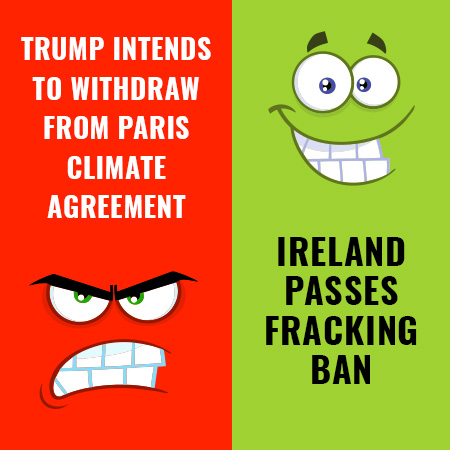It is a historic day on which one nation passes a ban on onshore fracking, while another nation intends to walk away from the Paris climate agreement.

Paris agreement withdrawal makes U.S. a rogue nation
In her statement, Wenonah Hauter, executive director of Food & Water Watch and Food & Water Europe, roundly condemns Trumps withdrawal from the global climate agreement:
“The Paris accord falls far short of the bold, decisive action needed to avert the most serious impacts of impending climate chaos – but it is certainly better than nothing. By choosing to walk away from the table, the United States effectively becomes a rogue nation when it comes to matters of climate change, human rights and global leadership in general. Mr. Trump’s foolish, belligerent decision to abdicate responsibility at the federal level now makes real action on climate at the state and local levels even more critical. For the sake of our planet and future generations, it is imperative that elected leaders at every rung of government – from the smallest town halls to the halls of Congress – do everything in their power to resist fossil fuels and help enable a clean energy revolution.”
Americans must do everything in their power to counteract Trump’s destructive plans, but action in other countries is now more important than ever. It might be a silver lining that on the very day the U.S. president disregards the first global accord to combat climate change, the Irish Dáil decides to forbid the production of hydrocarbons by fracking.
No fracking in Ireland – but what about importing fracked gas?
While Ireland voted in favour of fully divesting from fossil fuels earlier this year, the Parliament takes another important step further with today’s fracking ban. Grassroots movements and other organizations as well as individuals fought hard for this victory to protect the health of Irish citizens, Irish water, the environment and the global climate.
No need for Shannon LNG in Ireland
It will be crucial to see how Irish plans concerning their gas supply will now develop. Since at least 2006, there have been plans to build an LNG terminal in the country. Until now, construction of the terminal, supposed to re-gasify liquefied gas shipped to the Island from all over the world, has been delayed several times. The Shannon LNG Terminal should have a final maximum regasification capacity of 10 billion cubic meters (bcm) per year. Between 2010 and 2015, Irish gas demand dropped by nearly 20%, leaving the country with about 4.5 bcm of yearly gas demand according to Eurostat. The planned import capacity of 10 bcm per year would therefore be twice higher than what Ireland consumes.
Fracked gas for Shannon LNG contrary to climate targets, human and environmental health
With the Dail’s decision to ban fracking, the Shannon project is even less justifiable than before: The terminal is supposed to receive not only gas from the east through the Suez Canal and from the north from Norway, but also U.S. gas from the Gulf of Mexico.
Due to its important methane emissions, shale gas is significantly worse for the climate than conventional gas and, according to the scientific community, even comparable to coal. Its extraction has serious impacts on water, air and surrounding communities.
The EU-COM/Ecorys Trade Sustainability Impact Assessment report on the Transatlantic Trade and Investment Partnership (TTIP) highlights for example that “there are, however, some public concerns about the environmental aspects of shale gas production, such as methane leakages, with shale gas likely to form a proportion of the LNG exported from the U.S”. The report also points out that the expansion of U.S. LNG imports could harm human and environmental health and stimulate fracking in the U.S. Finally, it refers to the EIA 2015 Annual energy outlook, stating that emissions of methane along the supply chain will dent the environmental credentials of gas unless action is taken to tackle these leaks.
Moreover, it’s not even sure that the U.S. will be capable of exporting as much LNG as some hope. The Industrial Energy Consumers of America have already reached out to U.S. Energy Secretary Rick Perry, calling for a U.S. LNG export moratorium.
Building such a terminal with the purpose of importing climate-altering fracked gas while at the same time forbidding the harmful method of fracking on its own territory is irresponsible and would undo the great signals Irish policy decisions have been sending out recently. We will closely watch the next steps taken with regard to this project.
The Irish should keep up the positive momentum and truly gain independence from fossil fuels. They, and others, should clearly show Trump that they despise his actions and that fracked American gas is not wanted and needed in Europe.


